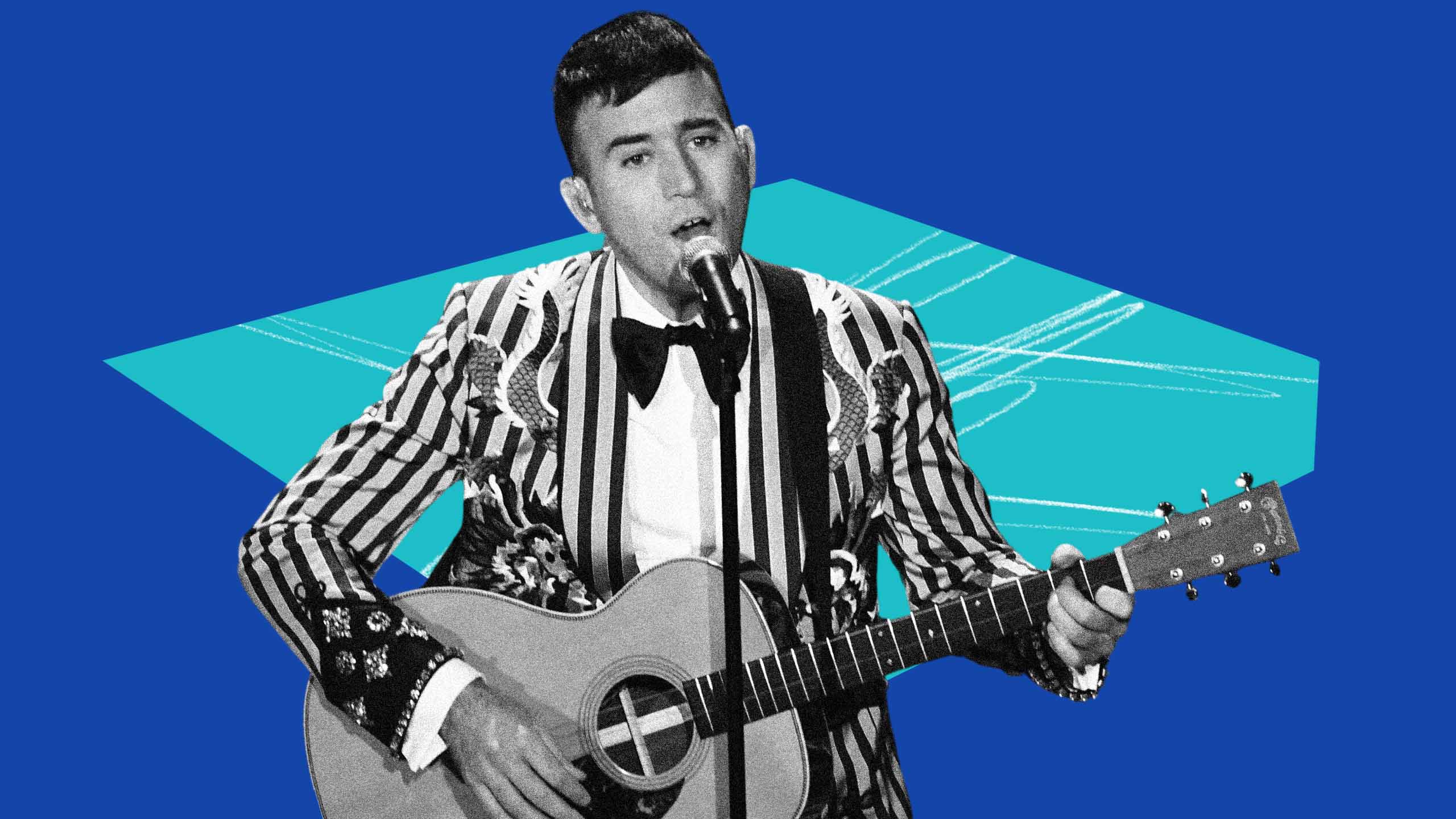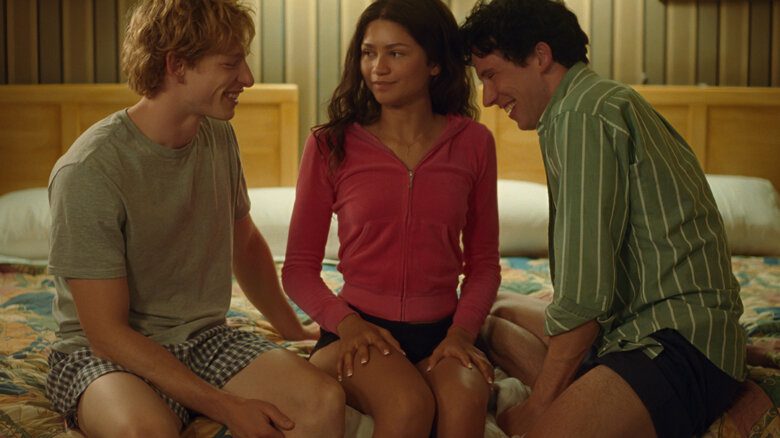Last week, beloved singer-songwriter Sufjan Stevens released his 10th studio album, Javelin, to much critical fanfare. But Stevens’s Instagram post marking the album release got almost more attention than the music itself, as he seemingly confirmed his queerness publicly for the very first time.
“This album is dedicated to the light of my life, my beloved partner and best friend Evans Richardson, who passed away in April. He was an absolute gem of a person, full of life, love, laughter, curiosity, integrity and joy,” Stevens wrote, accompanying an image of Richardson.
It’s not a traditional “coming out” by any means, but the message was certainly read as a coming out by the media. Us Weekly wrote: “Sufjan Stevens comes out, dedicates album to late partner,” whereas Queerty wrote: “Sufjan Stevens comes out in emotional note about new album dedicated to his late partner.” PinkNews opted for “Sufjan Stevens comes out with moving album dedication to ‘beloved’ late partner.”
These headlines all say the same thing. But I think it’s worth asking: is this actually a coming out? Stevens is an artist who’s been embraced as queer by queer fans for decades. Are we doing a disservice to Stevens’s life and grief by forcing this intimate tribute to his late partner into the coming out mould?
Today, Oct. 11, is National Coming Out Day. It’s a day that queer and trans folks often take to mark the momentous occasion that coming out can be. Activists Robert Eichberg and Jean O’Leary, who established the day in 1988, originally meant it as an extension of the mantra “the personal is political,” a phrase that captures how homophobia and transphobia thrive in silence, that if friends and family knew that they had LGBTQ2S+ loved ones, they’d be less likely to be homophobic or transphobic.
“Most people think they don’t know anyone gay or lesbian, and in fact, everybody does. It is imperative that we come out and let people know who we are and disabuse them of their fears and stereotypes,” Eichberg said in a 1993 interview.
In the past 30 years, the landscape has certainly changed when it comes to coming out. More people are certainly aware of the queer and trans folks in their life. With one in five Gen Z Americans identifying as queer, it can often seem like coming out isn’t that big of a deal anymore.
Many queer and trans folks these days, myself included, will point out that we’re sort of always coming out—transness is disclosed when you take off your shirt at the pool to show top surgery scars, queerness is revealed in holding a partner’s hand in public. Thriving online communities have made space for young queer and trans people to not feel so alone, and to come out slowly. And broad representation in media means that we often don’t have to explain the very concept of queerness or transness to loved ones—that door is already partially open.
And broadly speaking, small acts of visible queer or transness are easier and more publicly accepted than they used to be (though many right-wing lawmakers seem hell-bent on rolling that acceptance back).
But the personal disclosures and coming outs to loved ones, depending on how we feel they may be received, can still be big and scary and momentous, particularly if we’re unsure of how those loved ones will respond.
So while the overall landscape of coming out may have changed in recent decades, the concept of coming out and its place in queer and trans culture remains cemented, from average everyday folks like you and me, to the queer and trans celebrities we look to. A community under siege needs a flag to wave and flag bearers to carry the banner. And while politics can manifest in other ways, coming out still matters, and so does a day like today that acknowledges it.
I am grateful that we are no longer in a world where celebrities have to come out on the cover of TIME magazine and say “Yep, I’m gay!” But the big, momentous comings out of famous figures can be cathartic and inspiring—I attribute a lot of my own trans journey to seeing Elliot Page speak so openly about his, for example.
The queer community collects famous queer people like Pokémon cards, slotting them into our emotional binder to show off and say “See! One of us!” to anyone who asks. Every time someone comes out, it’s a story, whether it’s a Big Brother UK contestant sharing her trans identity with the house, or Stevens nodding to his queerness in an Instagram tribute to his late partner.
And while what was once maliciously invasive speculation into the sexuality of celebrities has largely become less malicious in recent years—tabloids don’t treat being gay as the “gotcha!” it may have once been—it’s not necessarily become less invasive.
Look at Heartstopper star and teenage heartthrob Kit Connor, who was pressured into coming out as bisexual before he was ready due to invasive fans. Or even Taylor Swift’s legion of “gaylors,” who’ve devoted countless hours to speculating about the singer’s sexuality even as she’s romantically linked to one of the most famous male football players in the U.S.
Which brings us back to Stevens.
His music, going back to the ’00s, is often specifically, vivaciously queer. The song “The Predatory Wasp of the Palisades Is Out to Get Us!” details an intimate relationship with a male friend at a Methodist summer camp. While “All of Me Wants All of You” can be seen as a tribute for a lover or his own mother.
And his music has soundtracked so many big gay feelings for so many people (yours truly included). Just think of that final scene of Call Me By Your Name, as Timothée Chalamet’s Elio weeps in front of a fireplace backgrounded by Stevens’s “Visions of Gideon.” Or, more personally, the spring semester I spent abroad in Ireland during undergrad, riding a bus through winding rural roads while listening to Stevens’s 2015 album Carrie & Lowell and thinking about what the rest of my life could be, not long after coming out for the first of many times.
While I and many other fans have developed our own parasocial relationships to Stevens and his deeply personal music over the years—and his online writings in spaces like Tumblr—we actually don’t know Sufjan Stevens the person. Because he is just that: a person.
It’s fair to assume Stevens, who turned 48 earlier this year, has almost certainly been openly queer to himself and to the people who matter to him, for a long time. And just because he’s never said the words “I’m queer!” in a public forum shouldn’t lessen his lived queer life or his vast contribution to the queer lives of countless others.
Queerness isn’t all about that declarative coming out, and not every queer is tasked with bearing the flag for the whole community as a public figure. For so many of us, coming out is just a small part of the equation—a moment in time amidst the rest of our queer or trans life.
Stevens doesn’t owe us—fans, the world—a coming out, particularly one tied so deeply to grief and his personal life. Sure, it’s nice to know that he loved and was loved by Richardson, that they had one another, and that Stevens’s queer music comes from a queer life. But rather than dwelling on the coming out part, we can and should also dwell on that life and the love and the music.
On National Coming Out Day, LGBTQ2S+ folks and our allies often share messages that it’s okay to not be out if you aren’t in a place where you can. But we should remember that it’s okay to be out without being “out,” and that even for famous people, coming out is not the be-all and end-all of queer life. Queer life is about so much more.
“Our own true ‘image’ is without a name or a face,” Stevens writes in an essay on love accompanying the release of Javelin.
“A baseless, shapeless cloud hovering above the waters, a countenance of empty atmosphere (signifying nothing)—a gothic apparition, a vision of love, a dance of the eternal travesty of life, a burrowing beetle of impenetrating curiosity. Digging for the true grit of life in the eternal dirt of the universe.”
No matter if or how or when we come out, let us all keep on digging for that true grit of life and those tiny truths.


 Why you can trust Xtra
Why you can trust Xtra


